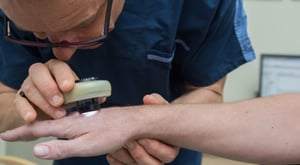What should I expect at my appointment?
Australia has one of the highest melanoma rates in the world. It's crucial for all Australians to get a regular skin check from a qualified medical professional at least once a year, or more often if they are at a high risk of skin cancer. To find out your risk, take our quiz.
 We deliver comprehensive skin cancer checks by specialised GPs. Our team offers valuable knowledge and the best possible care through each stage of your skin check, from the initial consultation and treatment, to your follow-up appointments and annual skin checks.
We deliver comprehensive skin cancer checks by specialised GPs. Our team offers valuable knowledge and the best possible care through each stage of your skin check, from the initial consultation and treatment, to your follow-up appointments and annual skin checks.
So, once you have booked an initial appointment with us, what should you expect from it?
1. Consultation
During your consultation, our team will ensure that any skin cancer concerns you may have are answered clearly and without medical jargon. We will guide you through the steps of a full skin check and take a complete clinical history.
2. Full-body skin check
Our skin cancer doctors will examine your skin from head to toe using magnification, dermoscopy and digital dermoscopy. Dermoscopy is the use of a special skin microscope which allows us to see beneath the skin to make a decision regarding a suspicious skin lesion or mole. Digital dermoscopy allows us to save images for future comparisons, leading to earlier detection of skin cancer and preventing unnecessary excisions. Learn more about full-body skin examinations.
3. Diagnosis
Our team will give you a diagnosis and advise you of the best course of action. We will also recommend further follow-up tests if necessary. If you are diagnosed with a form of skin cancer, you can be confident it will be treated with utmost skill in our state-of-the-art consulting rooms and theatres. Learn more about our available skin cancer treatments.
4. Follow-up skin checks
At your follow-up appointment, we will efficiently and accurately scan for any changes or new damage to your skin. Over time, we build a rich sequential history of your skin so that we can immediately identify new or changing suspicious lesions, giving you the best chance of early detection and treatment of skin cancer.
